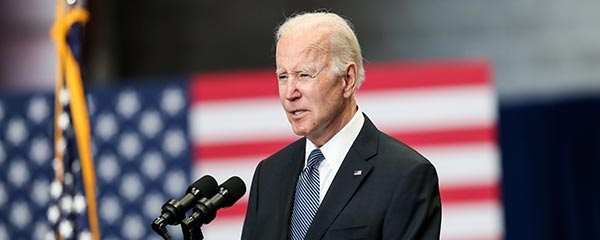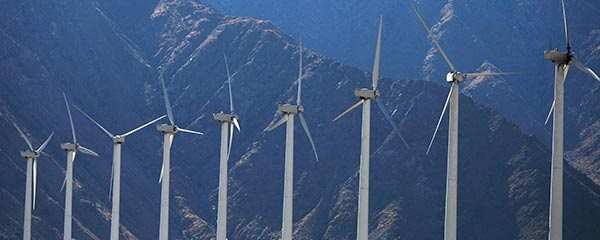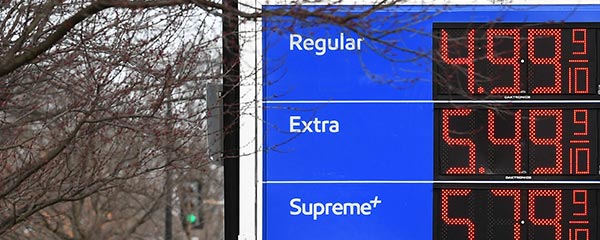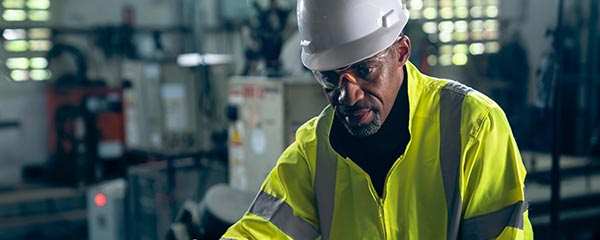Story Highlights
- 46% rate personal finances positively, down from 57% last year
- Inflation named biggest financial problem by a wide margin
- Half say gas prices caused hardship; majority expect they are temporary
WASHINGTON, D.C. -- Many fewer Americans now than a year ago rate their financial situation positively and more say their finances are getting worse than say they are improving. A record-high percentage mention inflation as the biggest financial problem facing their family. Meanwhile, about half say recent gas price increases have caused hardship for their family, well below what Gallup has measured during other times of rising fuel prices. The subdued reaction to gas price hikes may reflect that Americans expect those changes to be temporary rather than permanent.
These findings are from Gallup's annual Economy and Personal Finance poll, conducted April 1-19.
Americans More Pessimistic About Their Finances
Forty-six percent of U.S. adults, down from 57% last year, rate their financial situation as either "excellent" or "good." The current figure is the lowest since 2015, though somewhat better than the low points in the trend registered between 2009 and 2012 when as few as 41% rated their finances positively.
Additionally, 38% of Americans describe their financial situation as "only fair," while 16% say it is "poor." The latter figure is nearly twice as high as last year's 9%, though slightly lower than the 19% who said so in 2009 and 2010.
Meanwhile, 37% of Americans say their financial situation is getting better and 48% say it is getting worse, a reversal from last year when the majority said their finances were improving. The current figures are similar to what they were in April 2020 during the early stages of the coronavirus pandemic as well as during the Great Recession in 2008. In most years the question has been asked, Americans have been optimistic rather than pessimistic about the trajectory of their finances.
Americans in all income groups rate their finances less positively than last year. Each major income group shows a decline of between eight and 14 percentage points in positive evaluations of their current finances. The decrease in the percentage of middle-income Americans saying their financial situation is getting better is about half as large as it is among lower- and upper-income Americans.
A separate question in the survey finds a more stable and less pessimistic evaluation of personal finances -- 67% of Americans report they have enough money to live comfortably, down slightly from 71% last year. The percentage who report they are comfortable financially has varied little since 2013, ranging between 66% and 71%. The clear outlier in the trend was a 60% reading in 2012. However, before the Great Recession, a consistent seven in 10 said they had enough money to live comfortably.
Inflation Behind Growing Financial Woes
Americans cite inflation as the most important financial problem facing their family today, with 32% mentioning it in response to the open-ended question. That compares with 8% a year ago and is nearly double the previous high of 18% naming inflation in 2008.
Beyond inflation, 10% of Americans cite energy costs or gas and oil prices. Mentions of gas prices were last this high in 2012 (11%) and have been as high as 29% in 2008. Very few Americans between 2014 and 2021 said energy costs/gas prices was their most challenging financial issue.
Inflation is the top concern this year among Americans in all income groups but is mentioned more often by those in upper-income households (37%) than middle-income (32%) or lower-income households (27%). There are no meaningful differences by income group in mentions of energy costs.
Other common personal financial concerns this year among U.S. adults are lack of money or low wages (11%), costs of owning or renting a home (8%), healthcare costs (7%) and too much debt (7%). Healthcare costs and lack of money typically rank near the top of the list.
Gas Prices Causing Hardship for About Half in U.S.
Fifty-two percent of Americans say recent prices increases in gasoline have caused financial hardship for their household. Gallup asked this question in the past when gas prices were rising. Significantly more Americans said they were being financially harmed by increasing gas prices in 2005, 2008 and 2011 than say that now. The high points were 72% in September 2005 and 71% in May 2008.
Americans are more likely now to say higher gas prices are causing them financial hardship than they were in 2000, 2001, 2003, 2004 and 2018.
About one in seven Americans -- 14% -- say gas prices have caused "severe hardship" for their household. This includes more than one in four U.S. adults living in lower-income households (26%).
Overall, 70% of lower-income Americans say gas prices are causing them either severe or moderate financial hardship. That compares with 51% of middle-income Americans and 35% of those residing in upper-income households.
Majority Believe Gas Price Increases Are Temporary
Typically, Americans have been less likely to say they are experiencing financial hardship from higher gas prices if they believe the gas price increases are temporary rather than permanent. Currently, 57% predict increased gas prices will be a temporary change, while 42% expect them to be permanent. In other times of rising gas prices, most notably in 2008, majorities believed the gas price hikes were permanent and were more likely to say they were experiencing financial hardship as a result.
In the current survey, 40% of Americans who think the gas prices are temporary say the increases are causing them financial hardship. Among those who believe the price changes are permanent, 66% say they have been financially burdensome.
Republicans are one of the rare subgroups to expect gas price changes will be permanent. A 57% majority of Republicans say so, but 55% of independents and 75% of Democrats anticipate the price increases will be temporary.
Implications
The last two years have brought a series of economic challenges for the U.S., including widespread economic lockdowns, high unemployment and a recession early in the pandemic. While the economy has recovered since then, the fast pace of the recovery, high consumer demand for products, a tight labor market and supply chain issues have contributed to the highest inflation rates seen in four decades.
Nearly one-third of Americans name inflation as the most important financial problem for their family, and half say higher gas prices are causing them financial hardship. These issues appear to be taking a toll on Americans' financial outlook, with fewer Americans rating their situation positively than did a year ago and more saying it is getting worse.
Current personal finance ratings are similar to, if not worse than, what they were amid widespread economic shutdowns two years ago at this time. The fact that more expect gas price increases to be temporary, perhaps attributing the price hikes to the Russia-Ukraine war or, more generally, to past gas prices increases eventually receding, may be keeping Americans' assessments of their finances from being even worse than they are.
To stay up to date with the latest Gallup News insights and updates, follow us on Twitter.
Learn more about how the Gallup Poll Social Series works.




